- Home
- Adam Thorpe
No Telling Page 8
No Telling Read online
Page 8
So many people had lit candles over the years that the spikes around the glass seemed as if they were suppurating. Now we added ours, dropping our centimes into the dented tin box and choosing the longest candle. I slightly burnt my thumb-knuckle, lighting the wick with my mother’s cigarette lighter. Low down on the screen’s board was a very small photograph of Ste Thérèse de l’Enfant Jésus which showed the whole bed. It was only now, close up, our candle burning brightly, that I realised Ste Thérèse was dead in it. Her face was tiny, her eyes closed. She was laid out in her clothes. The crucifix was still on her chest and the arms were folded on top of the crucifix. She was definitely dead. In the corner of the photograph – part of it, therefore a lot bigger than normal size – was an old postage stamp with ripples of ink across it like waves.
When she was out shopping or in church, my mother left Nicolas with a woman called Eveline. She was old, with a face like a bun split by her mouth, and lived up the road in number 155. It was a ground-floor flat, full of souvenirs from places like Lourdes or Rocamadour. This was because she’d had six ailing children, and had kept on having to take them to these holy places, praying for an intercession from the Virgin. These trips had made her very poor, and my mother felt sorry for her.
‘Were the children cured?’
‘No, dear. Sadly, they all died before the age of fifteen. Something in the blood. You can see them resting in Bagneux cemetery, next to each other. Spent what was left on the tombs, from the look of it. Very smart. Poor thing.’
‘So why has she kept all the souvenirs?’
‘They’re not souvenirs, they’re relics. You don’t throw out relics just because you don’t get what you want, dear. That’s selfish behaviour.’
I was impressed by a statue of the Virgin on the sideboard because it was all black. Eveline told me that Saint Amadour had carved it from black wood. Saint Amadour’s real name was Zachaeus, in the Gospel, and he was very short and so had to climb into a tree to see Christ.
‘He was a rich swindler and ran an inn,’ said Eveline, picking up the statue and stroking it. ‘But Christ stayed in the inn and forgave Zachaeus and so Zachaeus became a good man, giving away half his money to the poor and not drinking any more and carving this miraculous statue.’
She talked about the statue as if it was the actual one that Zachaeus had carved. It was made of plastic, in fact, and was so light it felt like the Mickey Mouse squeezy toy.
The Virgins stared down at Nicolas and I began to believe they might intercede. O clemens, o pia, o dulcis virgo Maria.
They didn’t. My mother carried on hoping, though. She had a lot of Faith behind her anxiousness. As for Carole, she was talked about as if she’d done something sinful, as if it was because of her sinful behaviour that she’d ended up in bed all the time, feeling very low.
My mother blamed herself even more, though.
One day on the way to church, she regretted not using modern methods when my sister was a baby. Perhaps they had not yet been thought of, said – and anyway it was a difficult period just after the war, with not enough to eat and many towns in ruins and people settling scores.
‘Did you use those modern methods with me?’ I asked.
‘Yes, of course.’
‘How?’
‘Oh, feeding you when you were hungry. That was very modern and unusual. Even now.’
‘It sounds like poor countries in Africa.’
‘No, I don’t mean that. It’s a system. Mothers like to feed their babies at certain times, but babies don’t stick to those times. The mothers do.’
‘So Carole went hungry?’
‘I was under the sway of your grandmother, I’m afraid. Carole would scream and scream and I wanted to go but your grandmother, bless her heart, said she had to learn.’
‘Learn what?’
‘To conform, dear.’
‘Did she?’
‘Oh yes, she stopped screaming. But she looked ever so angry, poor little thing.’
We arrived in church and crossed ourselves and settled in our usual place, kneeling down to remind God that we were here. Except that I didn’t pray at all. I was looking through my fingers at the photographs of Ste Thérèse de l’Enfant Jésus. The photographs had changed: they suddenly felt far off and ancient. The patterns on the wallpaper, the water jug and oil lamp, the high wooden bed and the thin white face in it: it was all so ancient. Nothing was modern until I was born. Even the big photograph of her head and shoulders, leaning up like a door off its hinges, looked ancient.
I felt lucky to be modern, to be born in such an epoch. I gazed at the girl saint all through the service, feeling sorry for her. Her illness would have been cured, now. She would not have died. She would probably not have become a saint at all. It was dying so young that made her into a saint. I felt sad, suddenly, trying to make her eyes look at me. I felt my own eyes prickling, turning wet. Electricity and antibiotics and vacuum cleaners were coming between us. I was calling to her as she lay in her bed. She was turning her face towards me, sitting there in 1967. I was not dying but alive. In fact, I would live for so much longer that it seemed pretty well forever, thanks to modern methods.
My wet eyes made it look as if the girl’s face was moving. My heart thudded under my ribs as the priest started droning on in the pulpit: I prayed for the baby Nicolas, that he should survive and that he should be normal, in the name of the girl saint – asking her, really, for her intercession. Amazingly, she smiled at me through the blur. Then my mother nudged me and Ste Thérèse de l’Enfant Jésus froze again in the bed before she was found out by her own time.
‘Please concentrate, Gilles,’ my mother hissed, ‘and stop making such silly faces or you’ll stay like that.’
My little brother got no better, though. Nor worse. He was obviously very stubborn. Oncle Alain thought that was a virtue in this world. My mother didn’t agree.
‘He’s backward, isn’t he?’ I said, one day, using a term I’d learnt at school when talking about Africa.
My mother’s eyes grew large.
‘Gilles, whatever do you mean? Nicolas can’t help being ill.’
‘He’s not just ill.’
My mother said nothing, she just looked down at Nicolas in his cot and gave a little groan. Then, after a while, she murmured, ‘You are only young once. That’s what they’ll think. That I was too old.’
She began stroking the baby’s tummy. He whimpered, half-asleep – he only cried in his sleep, now, as if his dreams were bad. ‘Nicolas’s didn’t seem to fit him. No name did, in fact.
She said, ‘It’s God’s punishment.’
‘For what?’
She smiled sadly, a thin lock of hair falling in front of her face. She hadn’t been looking after herself: she looked older instead of younger, and unmade-up.
‘For everything,’ she said. ‘God doesn’t like us to lie.’
‘Why? Have you been lying?’
‘Lies start small,’ she said. ‘Then they grow bigger and bigger, because you have to tell more lies to cover up the first one.’
I thought she would go on, but she didn’t. I thought of my own lying, about the invented films and made-up activities with my sister in Paris.
‘Is he going to get better? Aren’t there modern methods that can help him?’
‘They don’t know what’s wrong,’ she said. ‘They’re going to do some tests, soon. You haven’t told Carole, have you?’
‘No.’
Blue rings circled her eyes, but it wasn’t make-up.
‘Best not to. It’ll only make her worse. We don’t want even more trouble.’
‘Was it what Nathalie had?’
My mother blinked with surprise. Her throat had creases running across it, even when she lifted her chin.
‘She didn’t have anything, Gilles. I lost her because she was born too early.’
‘Why was she born early, then?’
‘I was stupid. I was showing a client our stock and
the flex caught under one of the Philips, under its wheels, and I kept tugging it. I forced my tummy. At least, that’s what I think it was.’
‘Just because of that.’
‘Just because of that, dear.’
Her eyes started to go wet and I stopped talking about it.
Then, one day, we noticed Nicolas’s right hand curled up. We were very glad. Everything was going to be all right. Soon afterwards, we noticed that the right side of his face was swollen and bruised. At first we thought it was because he had rolled against the side of the cot, and my mother put padding around to stop it happening again. Another bruise came up, just below the old one on his right cheek.
‘Stop walloping him, Danielle,’ joked my uncle.
‘I do hope someone isn’t coming down and doing just that,’ said my mother.
‘Coming down, Maman? You mean Carole?’
‘I do hope not.’
‘But why should she do that? Of course she wouldn’t do that!’
Soon after, when the bruise was fading, I saw Nicolas hit himself with his little curled-up fist. He looked bewildered and in pain for a moment, then hit himself again, right on the eye. I told my mother, and at first she was relieved. Then she realised that it wasn’t what babies usually did. They learnt quickly that hitting yourself wasn’t a good idea, because it made a pain. We waited for Nicolas to learn that hitting himself was not a good idea, but he didn’t. The bruise got better quickly, but then after a few days there would be a new one. That little fist jerked up and struck the face as if the face and the fist were from two different people.
That was when my mother made an appointment with the special doctor. I came back from school and my uncle popped his head round the office door and said he wanted a word with me.
‘Well, it’s a great strain on your mother,’ he said. He was in front of the window, which had its blinds pulled down against the sun. I waited in the swivel seat by his desk, feeling the lizard skin on his cigarette lighter with my thumb. I didn’t look at him. I was tired, too. I looked at the photograph of the French Petroleum Institute. If only everything was as clean and lightweight as aluminium and glass!
‘She told me to tell you,’ he went on. ‘I didn’t want to tell you. Anyway, she says you know.’
‘What do I know?’
‘About the baby. About there being something wrong with him.’
An electrical charge whipped through me from head to toe. I shrugged, hiding my shock.
He moved over to the desk, sitting on the end of it, so close to me that his jacket knocked over the lighter as he settled. The surface of the desk was a shiny grey with tiny white hairs embedded in it on purpose and miniature moon-craters not on purpose where cigarettes had burned, melting the plastic. I knew everything on his desk: M. Alain Gobain etched into an aluminium block; an ashtray with a picture of the tragic film star Sylvia Lopez (whom my uncle ‘fancied’); a miniature Aspiron vacuum cleaner hand-painted like a lead soldier; the big black telephone; a transparent pen-holder in the shape of a pyramid; a model of a musketeer’s shoe; a tube of Baume Sloan for his foot-cramp; a small calendar in the form of a skull, its dates rotating on cylinders in the eye-sockets. It was like a view you know well from a window. He lit a cigarette with the musketeer’s shoe, the flame popping out of the heel.
‘You’ve been a great help. Very grown-up. Your sister’ll pull out of it. It’s what they call a depression, the doctor said. Probably chemical, in more ways than one. You mustn’t worry.’
I shrugged. He tousled my hair with his big furry hand, making me feel younger than I was.
‘There are very good places that deal with this sort of condition. The baby’s, I mean.’
He waved his hand. He was nervous, which I understood.
I frowned. ‘What, curing it?’
‘Nothing can cure him. He’s mentally retarded, chum. A posh name in Latin, very rare, one half of the brain not connecting with the other. You know you have two halves to the brain? Well, you do. Sometimes I think I have three. OK. Feels pain but doesn’t know why. Will never know why. Maximum life expectation, twenty-one years. Maximum brain power, he’s reached it. At three months.’ His after-shave wafted from him as he folded his arms, mixed up with the sicky smell of the insides of cars. ‘It is three months, isn’t it? God, maybe it’s four,’ he added, leaning towards the calendar, correcting today’s date in the skull’s eye. ‘Roughly.’
‘Nicolas.’
‘Yeah, Nicolas. He’ll grow big, bigger than normal, and then …’ He drew deeply on his cigarette while turning the shoe-lighter over and over in his other hand. ‘At twenty-one max, chum.’
‘Die?’
He nodded.
‘Afraid so.’
His suit was new, in the latest cut, with wide lapels on the jacket pockets; its sandy-brown colour and its pattern reminded me of bricks. A white thread straggled out from the hem, perhaps where the price had been. I wondered whether to tell him about it.
I saw Nicolas rise up as a baby angel, even at twenty-one.
‘The tests?’
‘Had ’em.’ He hid his face in smoke, then flapped it away as if it annoyed him. ‘I’m only quoting the blokes in white coats.’
‘But I thought the tests would help him.’
‘Tests are tests, not miracles.’
‘We can take him to Lourdes.’
‘Gilles, I don’t want to sound pagan, but what he’s got isn’t a runny nose or even a withered leg.’ He tapped his head again. ‘It’s the powerhouse, with half the cables blown. Or not even installed.’
‘I do know that.’
He ignored me, stumping out his cigarette before it was half finished. His hand trembled. His breathing was heavy, his nostrils whistling slightly, as if he’d been walking too fast. I noticed how black his nostrils were, charred from all the cigarettes he smoked. I stayed still, looking at the framed picture of the French Petroleum Institute on its neat lawn, the smooth lightness of aluminium and glass.
‘What do you see in that? That picture? Anyone’d think it was a television.’
I shrugged. He sounded cross.
‘Nice building, though. Or maybe it’s the woman, the girl.’
He chuckled softly.
‘Can we go fishing again, Papa?’
‘Fishing?’
‘Like we did before.’
‘Depends. I ought to. Didn’t work out very well, did it? Disappointed, weren’t you?’
‘No. No, it was good. It was good.’
‘Better than sticking in the showroom all day. You need to get out, in life. See things. Experience things. There’s a lot out there, you know. I don’t mean what your sister gets up to. Look what that’s done to her. Those beatniks, commies, students. Gypsies. That’s not life, that’s arsing about. I’ve been all over France, even into Spain, and basically everyone’s the same. We want to be content. We want not too much, not too little. Some people aren’t happy with that, of course. They want the lot,’ he said, lighting another cigarette with the shoe. ‘They want the pay-packet and the factory, chum. Turn the place into the Soviet Union, bloody Red China. Little Red Books. Put the rest of us up against the wall. That’s what we ought to do to them, of course. Before they have us all speaking bloody Russian or Chinese and working on an assembly-line. Making bloody vacuum cleaners.’
He chuckled, then ran his hand over his forehead, the fresh cigarette burning between his fingers.
‘Life wasn’t easy, you know, when I was your age. We even got kicked out of the house, in the war. Stank of wet dogs, when we got it back. Bloody Boche words all over the wallpaper. Rude drawings.’
I had never been able to picture my uncle as a boy, as someone my age. Though he had been a boy, of course. I had seen photographs at Gigi’s. My uncle and my father, aged about four and six, were playing with a ball in a garden. There was a sandy path between shrubs, and a plank hanging from a fruit tree, and a cabbage patch. A man stood grinning in the cabbage
patch, leaning on a spade. The man was Gigi; the garden was the ‘orchard’, the one that had disappeared under the showroom.
* * *
My sister stayed in her room through most of the summer holidays. It became normal. My mother said that her aunt had stayed in bed for a year after Cousin Lucille was born. She kept on saying this, as if she hadn’t ever said it before. We treated Nicolas as if he was normal, too, although I knew he was going to have more tests.
At the end of the holidays, I went out with a friend and his three cousins in the Vincennes forest on a beautiful windy day. I came back in the late afternoon and ran straight up the stairs. I was full of a need to tell Carole about the forest, about how we’d invented this very clever catch-and-chase game with complicated rules that made it somehow real and how none of us had argued or called each other names, we had been so caught up in the happiness of the rustling, sunlit forest and of our complicated game that had worked so smoothly.
She wasn’t there. The unmade bed was empty, magazines scattered over the floor. She wasn’t in the bathroom or the toilet.
I ran down the stairs and looked in the sitting-room. My mother was taking a nap on the sofa because Nicolas kept her awake at night. I had a sudden idea and checked the showroom. For a moment the sun tricked me into thinking that Carole was silhouetted in the middle, but it was the cardboard woman. There was no one in the office, either.

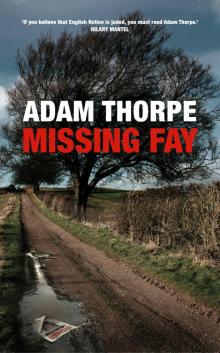 Missing Fay
Missing Fay Hodd
Hodd Pieces of Light
Pieces of Light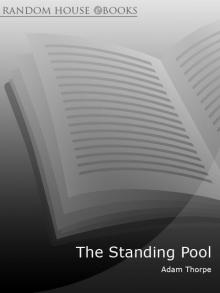 The Standing Pool
The Standing Pool Ulverton
Ulverton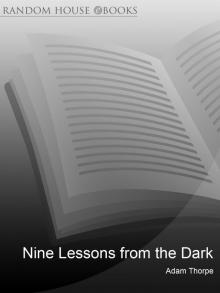 Nine Lessons From the Dark
Nine Lessons From the Dark Flight
Flight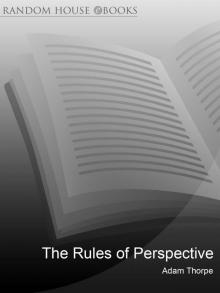 The Rules of Perspective
The Rules of Perspective From the Neanderthal
From the Neanderthal Is This the Way You Said?
Is This the Way You Said?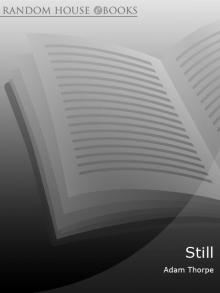 Still
Still No Telling
No Telling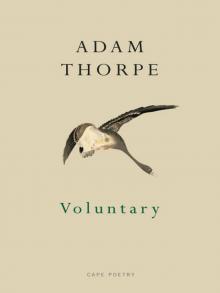 Voluntary
Voluntary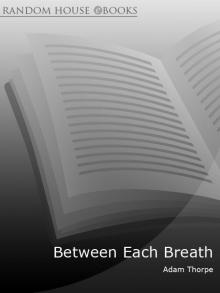 Between Each Breath
Between Each Breath